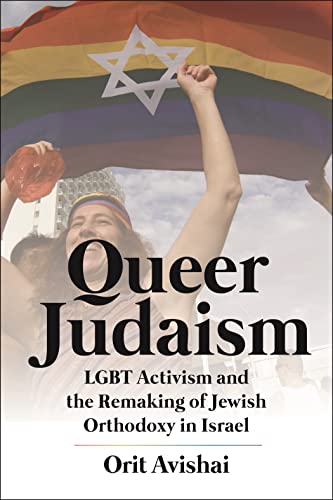Queer Judaism: LGBT Activism and the Remaking of Jewish Orthodoxy in Israel

“Orit Avishai has infused great passion and time into her research and writing, which shows the reader that a person can be openly LGBTQIA+ and a practicing Jew who can live a joyous, fulfilling, and meaningful life . . .”
This new book by Orit Avishai offers a compelling look at how Orthodox Jewish LGBTQIA+ people in Israel have become more accepted and how, until five years ago, they could never have imagined embracing their sexual or gender identity while staying within the Orthodox fold. Instead, they were obliged to follow Judaism’s rules, norms, and logic, including those that focused on gender, sexuality, and family life. This included marrying someone of the opposite sex and creating a normative family life. It often meant forsaking all forms of same-sex attraction because they were indoctrinated with scripture—particularly Leviticus, which includes a reference to homosexuality being an abomination.
Powerful social media platforms and rigorous campaigning over the past few years have resulted in LGBTQIA+ people no longer accepting second best and demanding to be seen, heard, and embraced. The results have gone in their favor. That’s not to say it has all been plain sailing; instead, they have now accepted there will always be some rabbi or other who would like to write homosexuality out of existence.
However, the Orthodox LGBTQIA+ communities refuse to be treated as outcasts or viewed as transgressors who must either bow out or accept their inferior status by remaining silent. The days of living in the shadows are over. While they have no desire to destroy the straight family, their motive is to create their “own” family identity within their LGBT+ identity while remaining Orthodox Jewish. They wish to be seen as LGBT+ persons of faith who embrace their sexual identity because of (not despite) their commitment to the Jewish tradition. All of this comes after a lifetime of being told that their sexuality, romantic desires, practices, attachments, and realities were incompatible with Judaism.
This book shows how homophobes use religion to remain homophobic and avoid being called out. Although most synagogues treat homosexuality with a don’t ask, don’t tell policy, those brave enough to confirm their sexuality are usually met with one of two responses. The first is usually harsh and aggressive. They are told there is no such thing as a religious gay person and that they are deviant and sinful, will never be accepted, and do not belong in the synagogue. Their choices are to either change their ways and repent or leave.
The second reaction enters the realm of wanting to change the person and borders on conversion therapy. Those divulging their sexuality will be told to seek help to overcome their “affliction” while also being advised to pray to “heal.” Some are made to feel they are 70% homosexual and 30% heterosexual, and with the latter, this means they can get married and have children, which will result in automatic freedom from same-sex attractions.
Orthodox LGBTQIA+ Jews are getting across their message that there is nothing wrong morally or halachically with individuals, men and women who exhibit homosexual tendencies. They are not going against God’s creation because they believe that not only did God create them, but He also created them in such a way that they cannot be changed. They believe there is no such thing as an exclusively straight soul because it does not exist. They are not looking for tolerance because such a thing would be just one step above loathing. Instead, they only invite acceptance and respect.
This new movement is not seeking to mobilize theology to suit the modern age. Its core belief is that a person’s sexual orientation and practices are a personal matter between them and God alone. By adopting this stance, they have become a conduit of religious change.
As a result, Orthodox LGBTQIA+ Jews are no longer a beleaguered minority. They no longer exist as lonely individuals but as a community within a community. Their message that they exist and that others need to make space for them is being delivered. Despite these advances, coming out as gay or transgender to family members is still a massively sensitive issue. Estrangements are still commonplace, with parents and siblings needing much support to accept the news. Some parents even go into a state of shiva (Jewish mourning of the dead) and sadly never come out of it.
Others who have come out face a “social death” in which invitations to social and family gatherings dry up. But despite this, they believe the price is worth paying because, for most, the closet was oppressive, and celibacy and heterosexual marriage were unappealing. And for transgender people, having to continue living in the gender assigned to them at birth was a living agony.
This deeply researched book includes 120 interviews with LGBTQIA+ Orthodox Jews undertaken by Orit Avishai. What the book lacks, though, is clearer visibility of the interviewees so the reader can truly hear and value their unique experiences—particularly those of bisexual and transgender people who only ever get brief mentions. Unfortunately, most of the interviews ended up being woven into the main text instead of some standing alone as case studies and/or vignettes. That said, Orit Avishai has infused great passion and time into her research and writing, which shows the reader that a person can be openly LGBTQIA+ and a practicing Jew who can live a joyous, fulfilling, and meaningful life they could not have imagined a decade ago.